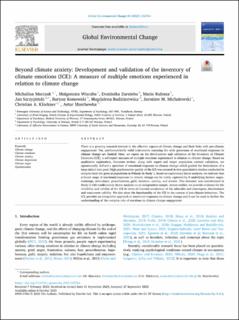Beyond climate anxiety: Development and validation of the inventory of climate emotions (ICE): A measure of multiple emotions experienced in relation to climate change
Marczak, Michalina Konstancja; Wierzba, Małgorzata; Zaremba, Dominika; Kulesza, Maria; Szczypiński, Jan; Kossowski, Bartosz; Budziszewska, Magdalena; Michałowski, Jarosław M.; Klöckner, Christian Andreas Nikolaus; Marchewka, Artur
Peer reviewed, Journal article
Published version
Permanent lenke
https://hdl.handle.net/11250/3116317Utgivelsesdato
2023Metadata
Vis full innførselSamlinger
- Institutt for psykologi [3141]
- Publikasjoner fra CRIStin - NTNU [38688]
Sammendrag
There is a growing research interest in the affective aspects of climate change and their links with pro-climate engagement. Yet, psychometrically valid instruments assessing the wide panorama of emotional responses to climate change are limited. Here, we report on the development and validation of the Inventory of Climate Emotions (ICE), a self-report measure of multiple emotions experienced in relation to climate change. Based on qualitative exploration, literature review, along with expert and target population content validation, we operationally defined a spectrum of emotional responses to climate change which guided the formulation of a large initial item pool. High psychometric quality of the ICE was secured in two quantitative studies conducted in samples from the general population in Poland. In Study 1, based on exploratory factor analysis, we indicate that a broad range of emotional responses to climate change can be viably captured by 8 underlying factors: anger, contempt, enthusiasm, powerlessness, guilt, isolation, anxiety, and sorrow. This structure was corroborated in Study 2 with confirmatory factor analysis on an independent sample. Across studies, we provide evidence for the reliability and validity of the ICE in terms of internal consistency of the subscales and convergent, discriminant and concurrent validity. We also show the functionality of the ICE in the context of pro-climate behaviour. The ICE provides an integrative approach to emotional responses to climate change and it can be used to further the understanding of the complex role of emotions in climate change engagement.

